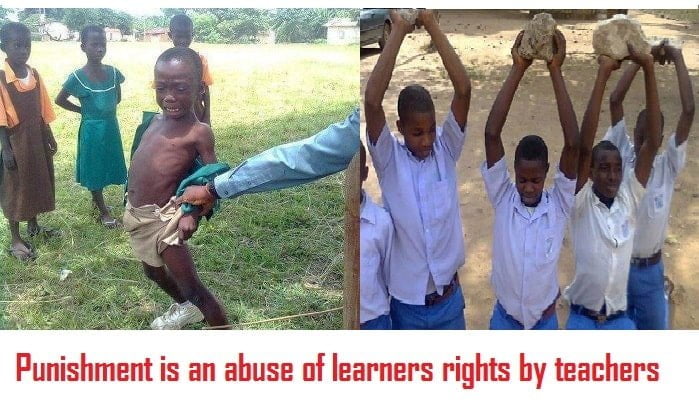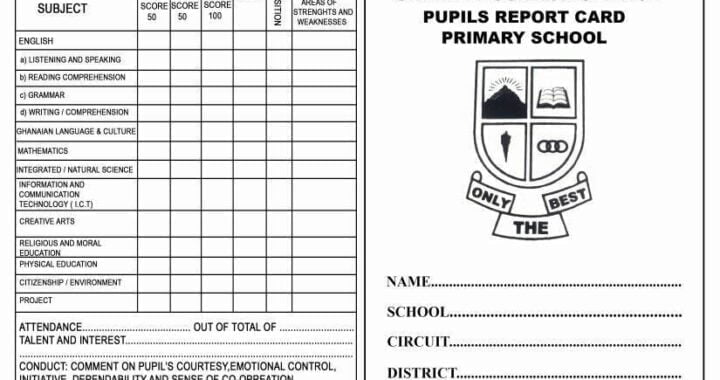Punishment is an abuse of learners rights by teachers caused by ignorance or negligence

Punishment is an abuse of learners’ rights by teachers; a set of actions or penalties imposed on students by the teacher due to misbehaviour of a student or for breaking the rules.
Punishment is an abuse of learners
This act has a serious impact on the student due to the harm it causes. It has the tendency to be very harmful because it often induces physical or emotional pain or both on the student and it may end up effective enough in reducing or preventing future misbehaviour from the student.
Punishment is used by teachers to control the behaviour of students, in two different ways:
Negative discipline involves verbal disapproval and reprimands
Corporal punishment involves severe emotional or physical pain
However, today, schools that are proactive have moved beyond this approach and have embraced positive discipline.
Positive discipline is the practice of training or teaching a student how to obey the code of behaviour or rules in a school or classroom in both the short and long-term.
Teachers need to deploy positive discipline to help develop the behaviour of students using self-control (emotional intelligence) as well as making positive choices.
In an effort to ensure the abuse of learners’ rights by teachers is avoided, the Ghana Education Service (GES) has made amendments to several policies within the pre-tertiary education sector in Ghana.
From the introduction of no canning in schools, not using learners during contact hours for economic gains of teachers such as teachers giving products such as meat pies and ice creams to girls to sell to preventing teachers from taking children to their private farms to weed.
Do you know that you are not even permitted to sack a student from a class for disturbing other students during a lesson? Teachers, it is time to innovate safer measures and adopt trouble-free principles in dealing with such bad behaviours among learners.
Punishing a child in school during contact hours so that the learner misses the opportunity to learn with colleagues under the disguise of punishing them have all been faded out however, the current insurgence of corporal punishment in some schools leading to the GES seeking to take disciplinary action against teachers leaves much to be desired.
One wonders if teachers who are still using the cane, giving learners with bushy hair cuts “wicked barbering” and the like are just ignorant of the law and the code of conduct of teachers, or is it mere negligence.
The Ghana Education Service is evolving the laws and the kind of corrective measures and actions that teachers in both public and private pre-tertiary schools can take to correct children without the student involved going through any emotional or physical abuse.
Gone are the days, parents will match their wards to school to be physically and emotionally humiliated in the presence of the entire school. Today’s professional teachers in Ghana must avoid all attempts at using corporal punishment as the corrective approach to dealing with deviant behaviours in schools and classrooms.
If ignorance of the teachers’ code of conduct and the content of the 1992 constitution of Ghana is the reason behind the sudden Sankofa of corporal punishment attitude of some teachers is due to ignorance, then there is the need for all teachers to study their code of conduct whiles subjects related to these laws should also be made part of the training of teachers. This will ensure they have a very good working knowledge of laws the bind them as professional educators in Ghana.
Chapter 5 of Ghana’s 1992 constitution is dedicated to Human Rights and Freedoms. Every teacher should consider this an important knowledge. Chapter 5 alone will suffice for teachers to know that there are laws in this country.
Teachers in Ghana need to understand their job today and not enforce discipline in ways that will put their professional and personal lives in jeopardy. The objective behind a decision to correct and child may be valid by failing to choose the appropriate method can bring a teacher’s reputation, toil, and profession crashing down.
Instead of taken the initiative to correct a child using corporal punishment, such students should be reported to the head of school who should invite parents or guardians. This saves the teacher from carrying the cross of a child’s misconduct.
The Ghana Education Service ought to come out with a simplified booklet on how teachers and school leadership must handle specific forms of indiscipline, train teachers on its use and application as well.
Teachers must avoid negligence if that is the reason behind the current gradual spark in corporal punishment. Teachers are expected to perform diverse roles in school including teaching and correcting unacceptable behaviours. However, corporal punishment and the like are wrong and illegal today. The failure of a teacher to act as required by the GES makes the teacher vulnerable because should he or she fail to apply the right method, due to ignorance of the best practices in correcting students today or negligence, that teacher endangers his or her career just trying to correct an unbending student.
Read: Female teacher remanded in prison for beating pregnant colleague
Some teachers may argue that the education system has been messed up because students cannot be punished or corporal punishment cannot be used. This assertion is wrong in the spirit of this article.
Some Positive Discipline Techniques teachers can use
Punishment is an abuse of learners rights by teachers and it will take teachers to stop it. This will require among other things
- Setting the classroom rules for your learners and have consistent expectations from them.
- Setting goals at the beginning of class and reinforcing appropriate behaviours.
- Remaining neutral during conflicts and find the root cause of a learner’s misbehaviour.
- Respecting student dignity, considering it, their rights, and human rights organizations before you act.
- Teaching models of proper behaviour for students to emulate.
Teachers, you need to work on your emotional intelligence and give the punishment you want to give to the next learner a second thought. Think twice, think smart act wise, do away with any attempt to use unapproved punishment to correct learners, and stay safe.
Source: Ghanaeducation.org


 GES 2024-2025 Academic Calendar for Public Schools
GES 2024-2025 Academic Calendar for Public Schools  GES to recruit university graduates and diploma holders-GES Director General
GES to recruit university graduates and diploma holders-GES Director General  GES is expected to announce reopening dates for public schools today
GES is expected to announce reopening dates for public schools today  Dr. Bawumia’s Smart Phone Credit Will Take 125 Years To Repay: A Misleading Promise
Dr. Bawumia’s Smart Phone Credit Will Take 125 Years To Repay: A Misleading Promise  2024-2025 Report Card Grading, Student Attitudes, Interests and Conduct Samples for Teachers
2024-2025 Report Card Grading, Student Attitudes, Interests and Conduct Samples for Teachers  US Staffing Agencies Recruiting International Job Seekers With Work Visa Sponsorship
US Staffing Agencies Recruiting International Job Seekers With Work Visa Sponsorship  Buy 1 Gig MTN or Airtel Tigo data for only GHS6.00 not GHS17.00
Buy 1 Gig MTN or Airtel Tigo data for only GHS6.00 not GHS17.00
If a teacher humiliate or abuses a student, what can he or she as a student do ?